In Operation
Here’s an image showing the output from ls.
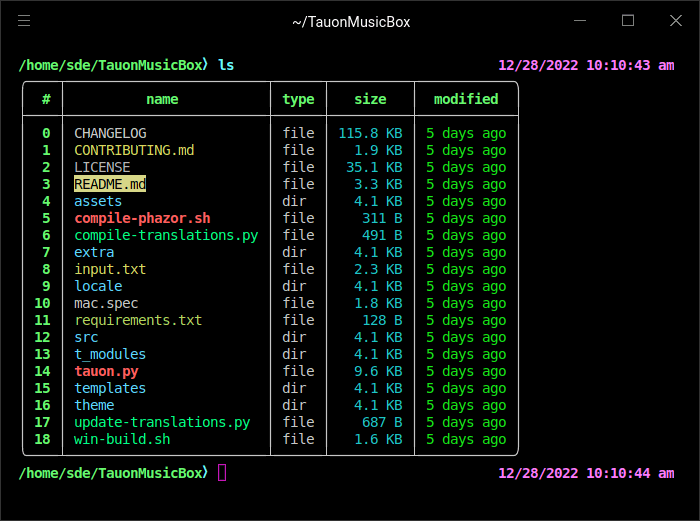
As you can see, the information is presented in a structured table. One of the strengths of Nu is its pipelines. This lets you use structured data to select, filter, and sort the same way. The shell lets you work with data more interactively.
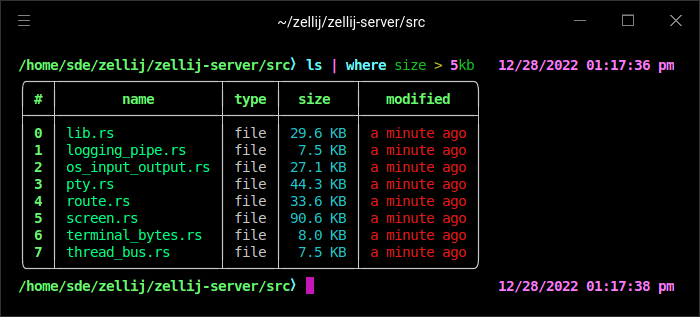
Nu also extends the idea of the pipeline to include more than just text. Nu models data using a set of simple, and structured data types. Simple data types include integers, floats, strings, booleans, dates. There are also special types for filesizes and time durations.
Nu includes many commands. At the time of writing, there are 466 commands available. Here’s 56 of them as shown by help commands.

The 466 commands are grouped into categories.
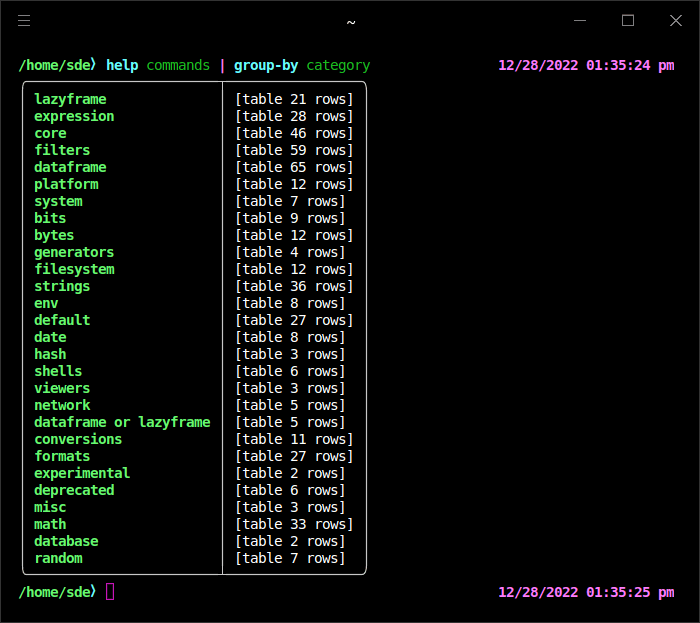
Help for each command is also readily available.
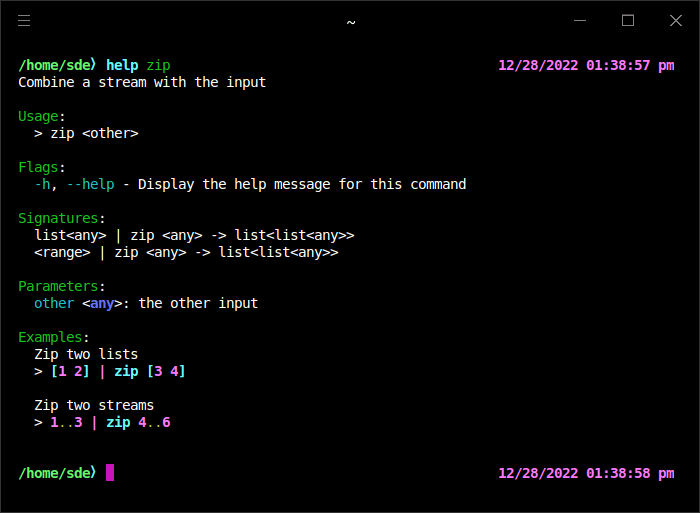
Features include:
- Environment variables are scoped and can have any type supported by Nushell.
- Nushell tables are core to the shell.
- Blocks – represent a block of code in Nu. Blocks are a useful way to represent code that can be executed on each row of data.
- Powerful plugins
- Easy to read error messages.
- Clean IDE support.
Here’s a memory comparison between Nushell and a bunch of other good open source shells. We’re showing memory usage at startup as reported by the ps_mem utility. The chart doesn’t include DASH which is another useful shell. Its memory usage is so frugal we’ll report its memory usage outside of the chart. DASH has a memory footprint of 0.4MB at startup.
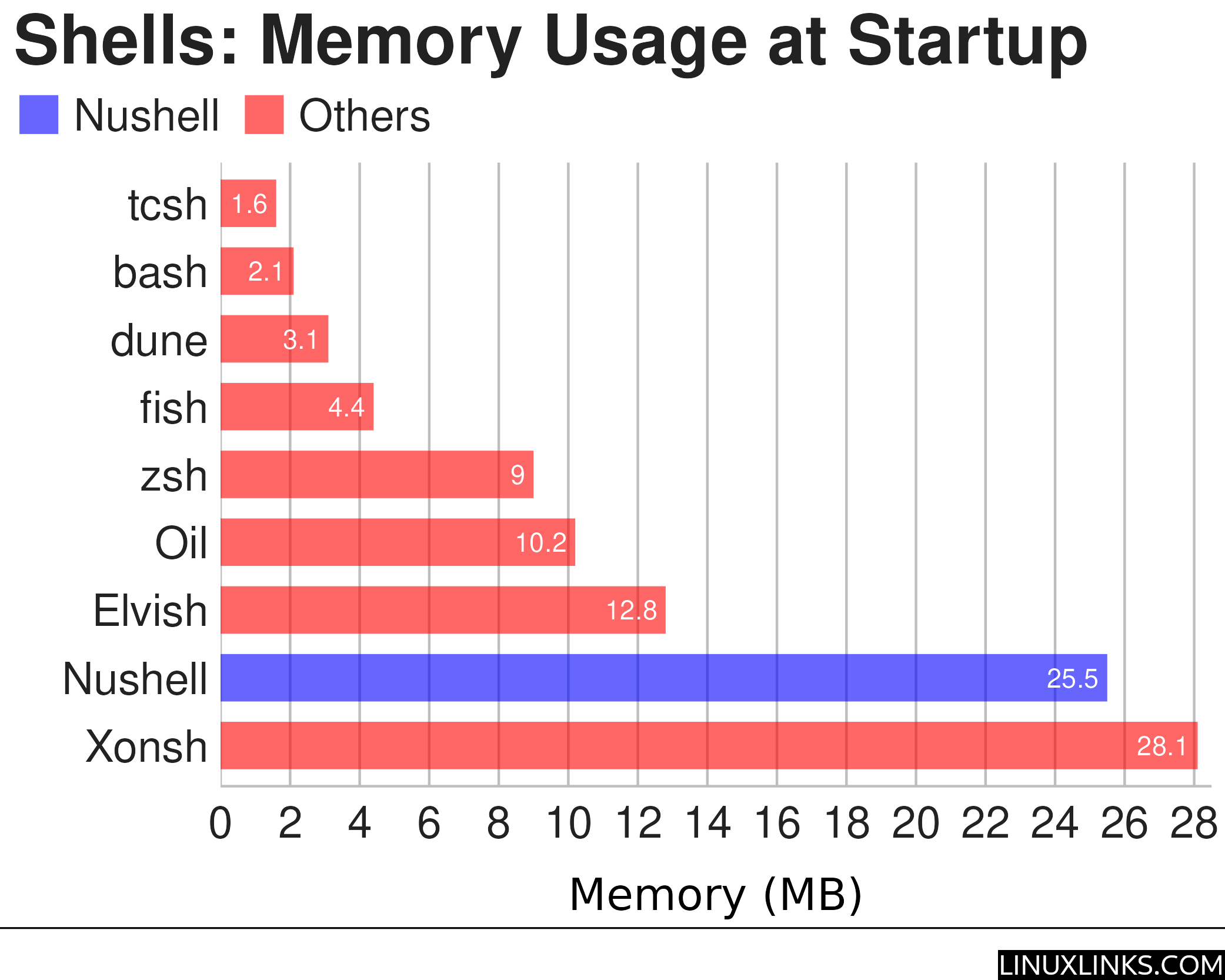
Pages in this article:
Page 1 – Introduction / Installation
Page 2 – In Operation
Page 3 – Summary
Complete list of articles in this series:
| Excellent Utilities | |
|---|---|
| AES Crypt | Encrypt files using the Advanced Encryption Standard |
| Ananicy | Shell daemon created to manage processes’ IO and CPU priorities |
| broot | Next gen tree explorer and customizable launcher |
| Cerebro | Fast application launcher |
| cheat.sh | Community driven unified cheat sheet |
| CopyQ | Advanced clipboard manager |
| croc | Securely transfer files and folders from the command-line |
| Deskreen | Live streaming your desktop to a web browser |
| duf | Disk usage utility with more polished presentation than the classic df |
| eza | A turbo-charged alternative to the venerable ls command |
| Extension Manager | Browse, install and manage GNOME Shell Extensions |
| fd | Wonderful alternative to the venerable find |
| fkill | Kill processes quick and easy |
| fontpreview | Quickly search and preview fonts |
| horcrux | File splitter with encryption and redundancy |
| Kooha | Simple screen recorder |
| KOReader | Document viewer for a wide variety of file formats |
| Imagine | A simple yet effective image optimization tool |
| LanguageTool | Style and grammar checker for 30+ languages |
| Liquid Prompt | Adaptive prompt for Bash & Zsh |
| lnav | Advanced log file viewer for the small-scale; great for troubleshooting |
| lsd | Like exa, lsd is a turbo-charged alternative to ls |
| Mark Text | Simple and elegant Markdown editor |
| McFly | Navigate through your bash shell history |
| mdless | Formatted and highlighted view of Markdown files |
| navi | Interactive cheatsheet tool |
| noti | Monitors a command or process and triggers a notification |
| Nushell | Flexible cross-platform shell with a modern feel |
| nvitop | GPU process management for NVIDIA graphics cards |
| OCRmyPDF | Add OCR text layer to scanned PDFs |
| Oh My Zsh | Framework to manage your Zsh configuration |
| Paperwork | Designed to simplify the management of your paperwork |
| pastel | Generate, analyze, convert and manipulate colors |
| PDF Mix Tool | Perform common editing operations on PDF files |
| peco | Simple interactive filtering tool that's remarkably useful |
| ripgrep | Recursively search directories for a regex pattern |
| Rnote | Sketch and take handwritten notes |
| scrcpy | Display and control Android devices |
| Sticky | Simulates the traditional “sticky note” style stationery on your desktop |
| tldr | Simplified and community-driven man pages |
| tmux | A terminal multiplexer that offers a massive boost to your workflow |
| Tusk | An unofficial Evernote client with bags of potential |
| Ulauncher | Sublime application launcher |
| Watson | Track the time spent on projects |
| Whoogle Search | Self-hosted and privacy-focused metasearch engine |
| Zellij | Terminal workspace with batteries included |

Nushell looks promising but I prefer Zsh to be honest.